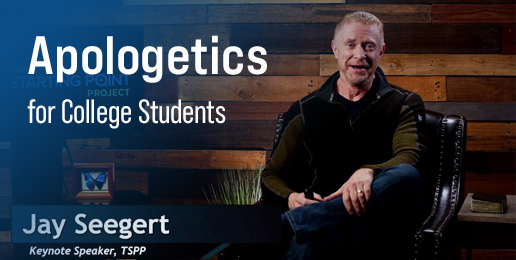
If you’re sending a kid off to college soon, have them watch this video. And if you’re a kid heading off to college soon, listen to your parents when they tell you to.
In a talk lasting just over an hour, Jay Seegert from The Starting Point Project presents a comprehensive guide to defending your faith in college, and he teaches from his own experiences as he faced opposition back when he was in school. It’s well worth a listen.
Jay starts out with a much-needed insight for those who feel overwhelmed by the sheer bulk of twisted social issues that infest our culture. Sexual issues like feminism, transgenderism, and gay unions. Racial fads like critical race theory, and identity politics. “Scientific” concerns like climate change and the various “green deals” proposed to fight it. The wokeness and virtue signaling exuded by those who climb on the bandwagon, and the cancel culture and other forms of censorship imposed on those who don’t.
Sound overwhelming? It doesn’t have to be, at least once you realize that it all comes back to an authority issue: Is the word of God authoritative?
Jay does a great job calling us back to the real source of disagreement between Christians and any of the myriad flavors of falsehood out there: God’s Word.
With this groundwork laid, Jay explores the various ways in which those at your college might attack your foundation. Your faith may face blatant ridicule or subtle undermining. Your opponents might pelt you with blanket statements, machine-gun you with a barrage of objections, or resort to attacks on your character.
Jay helps you develop critical thinking skills and be prepared for a variety of opposition.
And how then shall we respond? Jay gives some helpful tips about how to conduct yourself in conversation with someone hostile to your faith. Did you know that you can have a powerful effect in a conversation just by asking questions?
His presentation gives examples of just that. How do you know what to focus on, if there are so many points of disagreement to get tangled up in? Jay gives us five big-picture worldview points and encourages us to stick to those. That’s especially great advice for the college environment, where everyone seems to have a need to prove their knowledge about everything.
Even for those of you who are already well-versed in apologetics tactics generally, this presentation will likely have some new information for you—Jay takes time to give us tips specifically for the college context.
When are appropriate and inappropriate times to confront a professor about wrong teaching in the classroom? What about a test question that expects you to write an unbiblical answer unless you want to get it marked wrong? Jay provides simple, intuitive advice about how to handle these situations, showing us that we don’t have to choose between faithfulness and shrewdness as we maneuver about in higher education.
Finally—and this is what I especially appreciate about Jay’s talk—he acknowledges that persevering in faithfulness through college is about more than just apologetics! He speaks from his own personal experiences wrestling with tough questions, and he emphasizes the importance of Christian community and solid Christians whom you can turn to with your questions.
His advice is a helpful cautionary note to those who plan to persevere through college by girding up their logical loins and slogging it out alone.
Now, although I really appreciate the work Jay does in this presentation, there are a couple things I think he could have developed better.
First, a few times through his talk, he emphasizes how a particular strategy is a good way to avoid unnecessary embarrassment. For example, he recommends going to a professor’s office to confront him on something inaccurate instead of correcting him in class. Sometimes—and maybe even much of the time—that will indeed be the prudent thing to do, saving you from unnecessary ridicule and allowing you to have a more productive discussion one-on-one.
However, is there possibly a time where your classmates might benefit from you vocally challenging a point, even if you suffer humiliation? You might unknowingly bolster a Christian classmate’s confidence, or show an unbelieving classmate there is another side to the issue, even if on the surface it seems like “you lost.”
God doesn’t call us to live perfectly humiliation-free lives; the lives of the prophets and apostles make that clear. I do agree with Jay that it’s generally a good idea to avoid unnecessary humiliation, but I wish he had also reminded us more that boldness for the sake of Christ is also a good thing, and sometimes God uses our humiliation for His own glory.
Second, Jay’s talk could have underlined the proper context of apologetics with a few more underlines. His points about a Christian support network help remind us that it’s not all about logic, but I think he should have emphasized more clearly that the key to “college-proofing” your faith is not ultimately apologetics at all.
This is because your faith is not an academic exercise; your faith rests in a Person. No amount of critical thinking, shrewdly-worded questions, or big-picture arguments you master, your faith will ultimately transcend the academics and find its only true anchor in God Himself.
And this time, I speak from personal experience, as a current college student who’s very academically minded and has had to discover this lesson the hard way.
God never calls us to be anti-intellectual, but He also never calls us to rest our faith on our own understanding. And so, while many of Jay’s tips are very effective for helping others see that Christianity is not irrational, and for helping you destroy arguments that set themselves up against the knowledge of Christ, they will never “college-proof” your faith because they will never be its sure foundation.
Remember that your own faith is a gift from God, flowing from Him, grounded in Him, and pointing you to Him.
The real college-proofing comes from your earnest walk with Christ, repenting from your sin, trusting in His gospel for salvation, cultivating your relationship with Him, submitting to His lordship, worshiping in His body, and never being deceived by the voice of the enemy even when it sounds like your professor.
Always remember that your faith is in a Person, and if you completely trust that Person—as He calls you to do—you can know ahead of time that no academic argument that comes against Him will prosper.
But with those caveats in place, watch on! It’s worth an hour of your time if you’re in that stage of life, and even if you aren’t, maybe you’ll soon pour into someone else who is.
























